For the first time since 2019, members from across the five regions of Mennonite Church Canada gathered in person for learning, inspiration and decision-making. Meeting at a conference centre in Edmonton, from July 29 to Aug.1, approximately 215 people experienced the joy of being together again in a large gathering.
Because of the pandemic, some things were different. Gathering 2022 was planned as a hybrid event, with 100 attendees participating through a virtual platform, including one participant from Japan. For the July 31 morning worship service, an additional 100 people joined via YouTube, along with other Mennonites from the Edmonton area who took part in person.
Attendees at the venue wore masks for most of the time, and were encouraged to self-monitor for possible COVID-19 symptoms. But the spirit of Gathering 2022 was upbeat, as evidenced by the whole-hearted singing during the worship times and the engaged table conversations.
The theme “We declare” found expression in a “commissioning and blessing” that concluded each of the four main worship times. Based on I John 1:1-4, the 11-line affirmation reiterated the invitation to declare Jesus, the Word of Life, as experienced through sight, hearing and touch. (See sidebar below.) Attendees learned simple gestures to accompany the spoken words, creating a sense of energy and action throughout the meeting space.
Tany Warkentin, an Alberta pastoral leader, led the worship times, with Anneli Loepp Thiessen and a team of singers and instrumentalists leading the music. The visuals for the meeting space pointed to a mountain theme, through an art installation of stylized, multi-coloured mountains created by Annie Dyck and Ernie Engbrecht of Lethbridge (Alta.) Mennonite Church. Projected images of mountains added to the mood, along with recordings of Alberta Mennonites providing musical offerings.
Declaration
Gathering attendees participated, with words and actions, in an affirmation based on I John 1:1-4:We will declare:
what we have heard,
what we have seen with our eyes,
what we have touched with our hands.
We will declare the Word of Life:
so that we might have fellowship with one another,
so that we might have fellowship with God and with Jesus Christ,
so that our joy may be complete.
We will declare the eternal Word of Life.
Exploring the theme
At the opening service on the evening of July 29, speaker John Boopalan, an assistant professor of biblical and theological studies at Canadian Mennonite University, addressed the question, “What is the gospel?”
Looking at stories in the Bible and from past missionary efforts in India, he invited listeners to consider how God’s good news was, and is, embodied in human flesh—both in Jesus’ incarnation and in the lives of his followers.
“If God has permanently taken material form and deeply participates in the life of the world, who we are— our witness, how we move with our bodies for or against others—all of that matters deeply,” Booplan said. “Bodies matter at all times: in life, in death and what comes after.”
“The Gospel invites us into communities of belonging in which bodies depend on each other in non-hierarchical and mutually reciprocating ways.” He continued: “When we take such an approach, we resist the temptation to think that we are superior, or that we need to save ‘inferior’ others, or the temptation to think that only we have the solution to a problem.”
He offered a reminder: “The gospel mends and heals through enfleshment and accompaniment. We do the accompaniment. God does the healing.”
Doug Klassen, executive minister of MC Canada, addressed the gathering in the July 31 morning service. He described the spiritual path as one of losing and finding, pointing to the three lost-and-found stories in Luke 15: the lost sheep, the lost coin and the lost son. Echoing a song the congregation had just sung, “God lights a lamp,” no. 299 in Voices Together, Klassen highlighted the image of God searching for the lost ones.
Reviewing Jesus’ ministry, Klassen pointed out the physical nature of his presence with people. Jesus ate, drank, walked and lived among them. In this way, he demonstrated his love for them.
These kinds of encounters caused his followers in the early church to say: “We declare what we have seen and heard.” Klassen described their seeing as looking upon, or gazing, which leads to a deep interpersonal experience, and he reminded listeners that “Jesus is first known in relationship. Our God is a god of intimate personal relationship.”
Klassen offered his own message from the heart: “How I yearn for us to get to a place in Mennonite Church Canada where our collective life isn’t so much fuelled by our doctrines, or confessions or covenants (though they are needed and secondary work). Rather, I yearn, I deeply yearn, for us to be fuelled by the seeing, the hearing, the touching, the gazing upon” that leads to deeper connection with God and with others.
At the closing service on the morning of Aug. 1, Kara Carter, who serves as pastor of Wellesley (Ont.) Mennonite Church, spoke on the topic of “Stumbling blocks and burning bushes: Transformed and transforming.” Starting with the story of the people of Israel wandering in the wilderness, she pointed out how the pandemic has brought a new reality to the church today. Like in the wilderness of the past, the people are again asking: “Who are we now as a people of God?”
She urged the church to put aside past expectations of what it should look like, and to pay attention to the community around the church building. In this “threshold space” what might God be saying to the church about its identity, programs and building?
“I believe the church is called to be comfortable with ambiguity and unknowing for as long as it takes,” Carter stated. Believing that God is creating something of beauty in the church, she asked, “What needs to die and unravel in order for resurrection to come?”
While affirming the Anabaptist value of community, she pointed out that this can easily cause people inside the church to focus only on themselves. But the idea of “ ‘separate from the world’ is working against us,” Carter said. She left listeners with an individual and corporate challenge: “When you go home, extend hospitality to one of your neighbours.”
A first at a nationwide gathering was a worship service organized by In This Together, a group of LGBTQ+ Mennonites and their allies. The Aug. 1 evening service included prayer, singing, storytelling and a ritual involving coloured ribbons.
Indigenous voices
Coming on the heels of Pope Francis’s visit to Indigenous communities in Alberta, We Declare 2022 gave attention to Indigenous voices and presence. Frequent land acknowledgements happened in the sessions, and attendees were invited to sing songs by Indigenous songwriters. All registrants received a copy of the book Be It Resolved: Anabaptists and Partner Coalitions Advocate for Indigenous Justice to take home. (It can be ordered online at bit.ly/3PbCj4l).
On the evening of July 29, guest Marilyn Buffalo welcomed attendees to Treaty 6 territory, sharing insights from her early years as part of the Cree community of Maskwacis and from her work as an activist later in life.
Emphasizing the need to keep learning and teaching about the realities of Indigenous communities in Canada, she encouraged the assembly, “We have to share with each other if we are going to make it as one, happy, fit, healthy nation from here on forward.” She continued: “Our children, your children, my grandchildren and your grandchildren must become friends. They must learn to be kind; they must learn to understand; and, more importantly, to respect each other.”
On July 30, keynote speaker Cheryl Bear addressed the question non-Indigenous people often ask in their desire for reconciliation, “Where on Earth do we go from here?”
Bear, who is a member of the Nadleh Whu’ten First Nation, a respected leader in Indigenous education in Canada, and a singer/songwriter, talked about her deep relationships to her own community. These sustain her in the hard work of addressing issues of injustice.
While she affirmed the work that Mennonites in Canada have done in response to situations of injustice, she urged, “Please keep listening [to the voices of Indigenous people]. Don’t ever think in your mind, ‘I know enough now.’ ”
To people who ask how they can minister to her community, she said emphatically, “Just please stop! Don’t!” Instead, for a couple years, they should seek to learn more about Indigenous Peoples—their cultures and history. Referring to one of the recommendations of the Truth and Reconciliation Commission, Bear invited Canadians to see Indigenous spirituality as being as valid as their own. She urged listeners to walk alongside her people and not try to convert them.
On the evening of July 30, Bear performed songs she has written and told personal stories of her life and advocacy.
Delegate sessions
Delegates from the regional churches gathered for two sessions, for a total of three-and-a-quarter hours. In addition to voting on the usual motions around finance and governance, the 80-plus delegates were given opportunity for conversations at their tables, in response to the reports received. At the end of each session, it was clear that delegates had more comments and questions than what the time allowed for.
Appreciation was offered for the service of outgoing secretary-treasurer Allan Hiebert and moderator Calvin Quan, who both served in their roles for six-year terms. Delegates affirmed a new executive for the nationwide church, with Geraldine Balzer (MC Saskatchewan) as moderator; Bruce Baergen (MC Alberta) as assistant moderator; and Paul Gilbert (MC Eastern Canada) as secretary-treasurer. The Joint Council met before and after the Gathering.
Learning, connecting and serving
A unique aspect of Gathering 2022 was the Young Leaders Experience, a mentorship program designed to foster leadership in the life of the church. Ten young adults took part, with expenses paid for them to attend the entire event. They read scripture in the worship services and participated in various other aspects of the gathering, including conversations with church leaders.
Attendees participated in workshops, both in person and virtually, exploring topics such as creation care, international witness, evangelism, and cultivating a culture of call.
Visitors also learned about the Edmonton area through a variety of tours, including visits to local communities of faith, a museum, an art gallery and natural areas.
As in other nationwide gatherings, volunteers from local Mennonite churches served in a variety of practical roles, in planning the event and hosting the visitors. Approximately 50 people were part of the volunteer roster.
Preceding the event, pastors and other leaders gathered at Edmonton’s First Mennonite Church for the Spiritual Leaders Day, a time of refreshment and inspiration.
Recordings of some sessions are available on the MC Canada YouTube channel.
For discussion
1. Can you think of a church assembly or gathering that made an impact on you? What are the highlights of such a gathering for you? Do you think online participation will be a sustainable option?
2. Doug Klassen commented that he yearns for Mennonite churches to be less concerned about doctrines and confessions, and more concerned about personal connections with God and with other people. Do you agree? If the Mennonite church moves in this direction, what would it mean for how we manage our congregations?
3. Kara Carter is quoted as saying that the idea of “ ‘separate from the world’ is working against us.” Do you think of yourself, your congregation, or Mennonites in general, as being “separate from the world”? Do you agree that we should move away from trying to be separate?
4. Cheryl Bear invited Canadians to see Indigenous spirituality as being as valid as their own, and urged listeners to walk alongside her people and not try to convert them. How ready are Mennonites today to listen to these words? How have attitudes changed over the last few generations?
5. As you read reports from Gathering 2022, do you think Mennonite Church Canada is moving in the right direction? What advice would you give the church?
—By Barb Draper
More Gathering 2022 coverage:
A focus on rest and renewal
‘Do you hear what I hear?’
In This Together aims to widen the circle of inclusion
Editorial: ‘We Declare’ and beyond

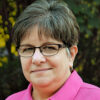
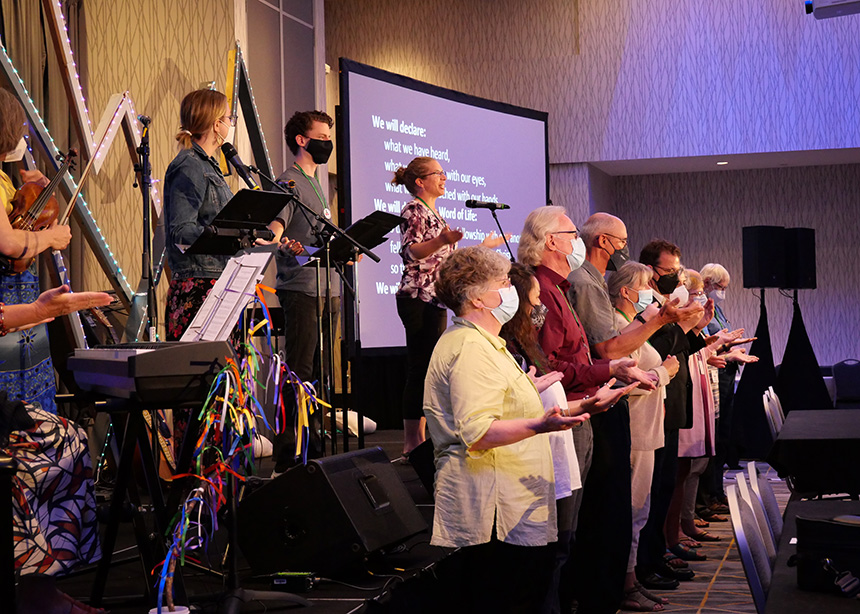


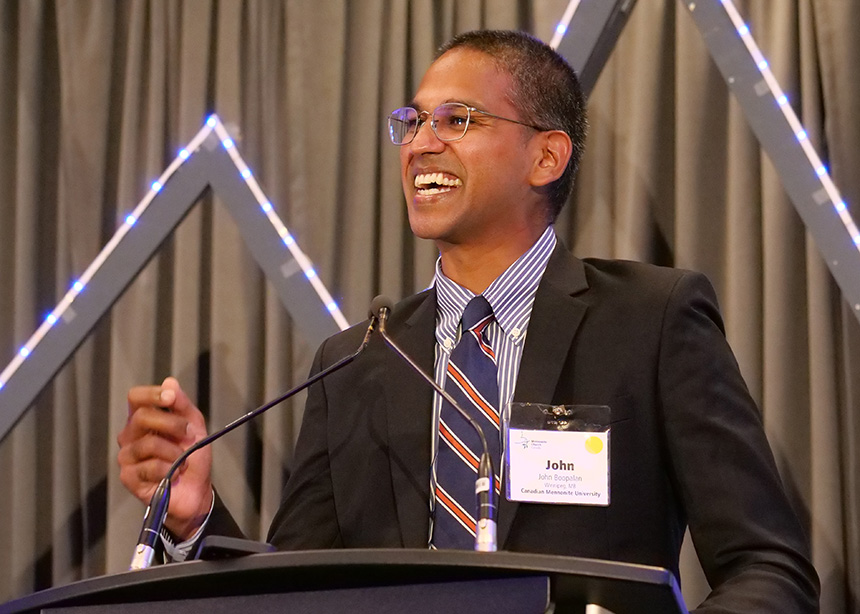
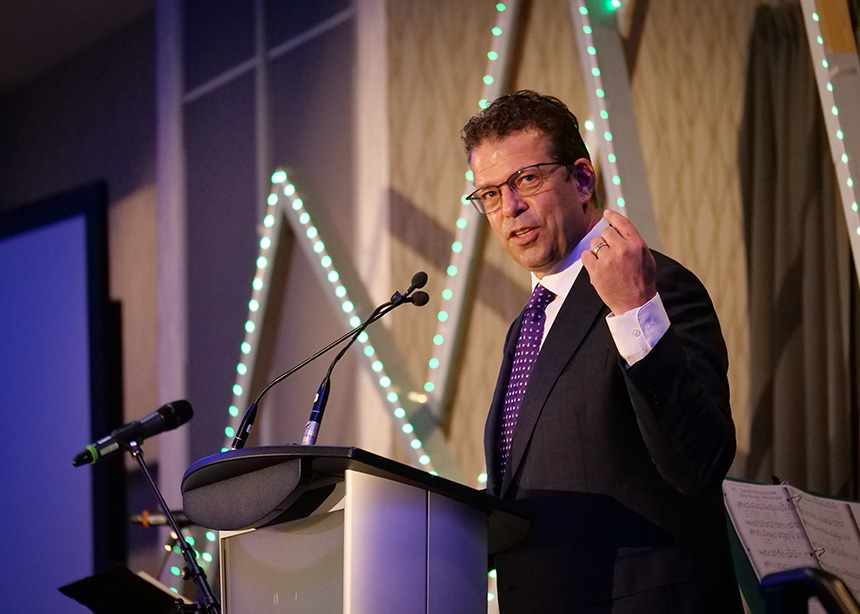
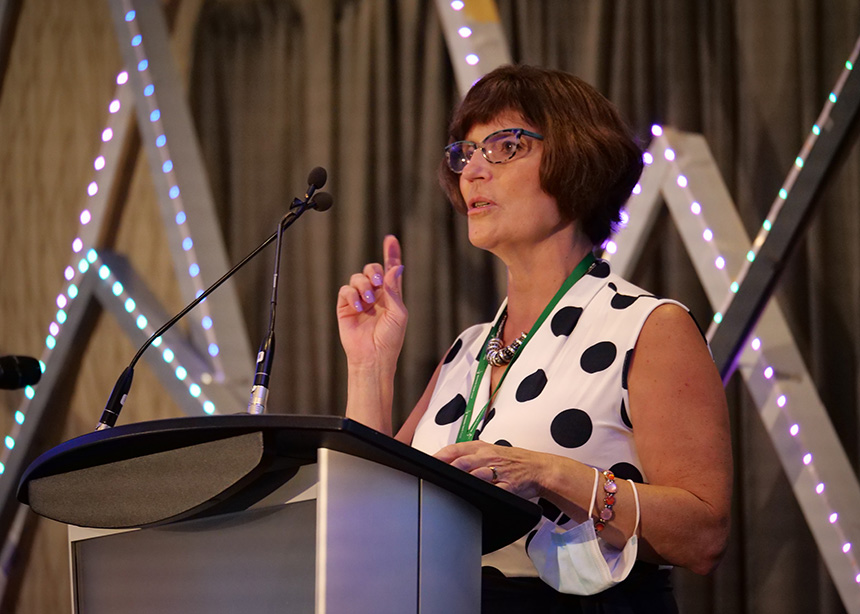
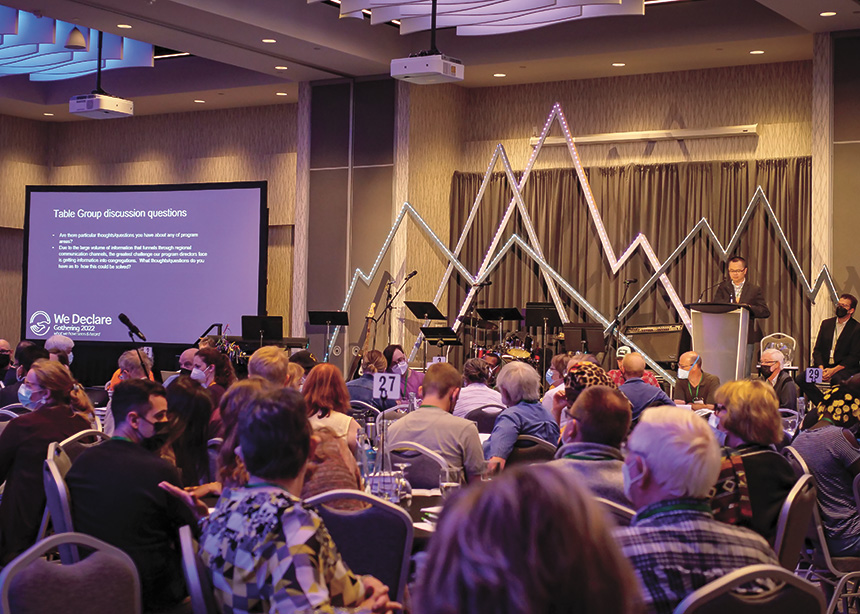
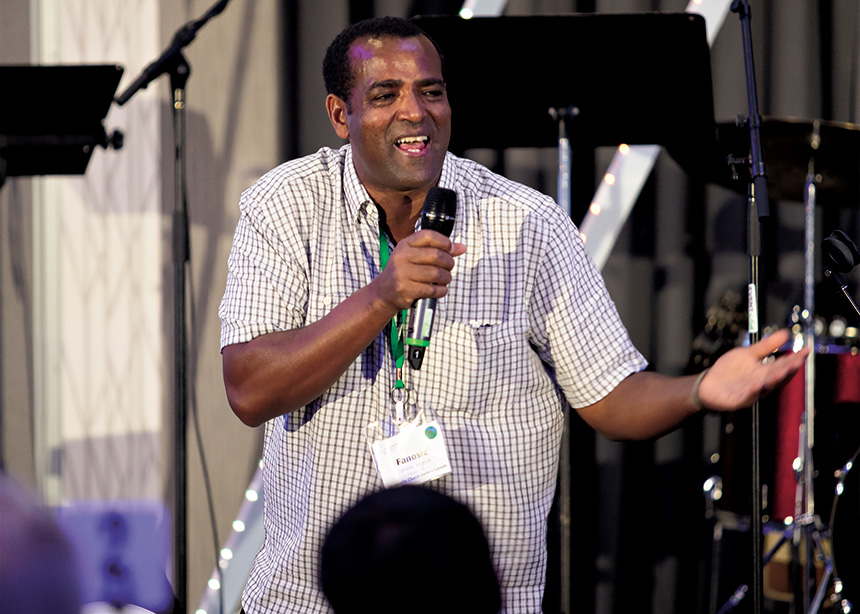
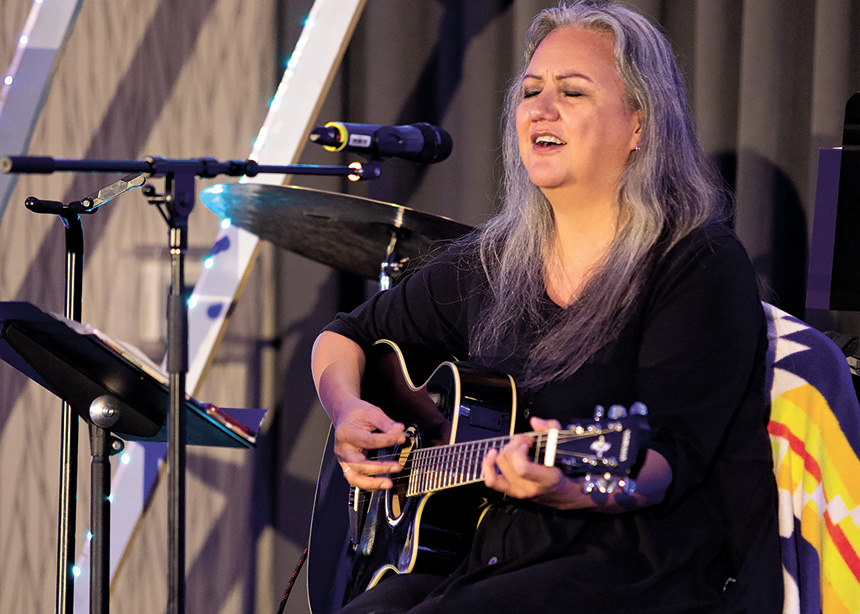
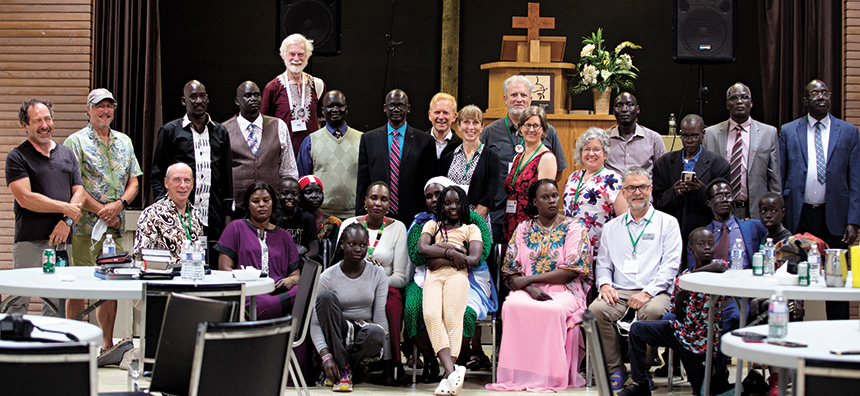
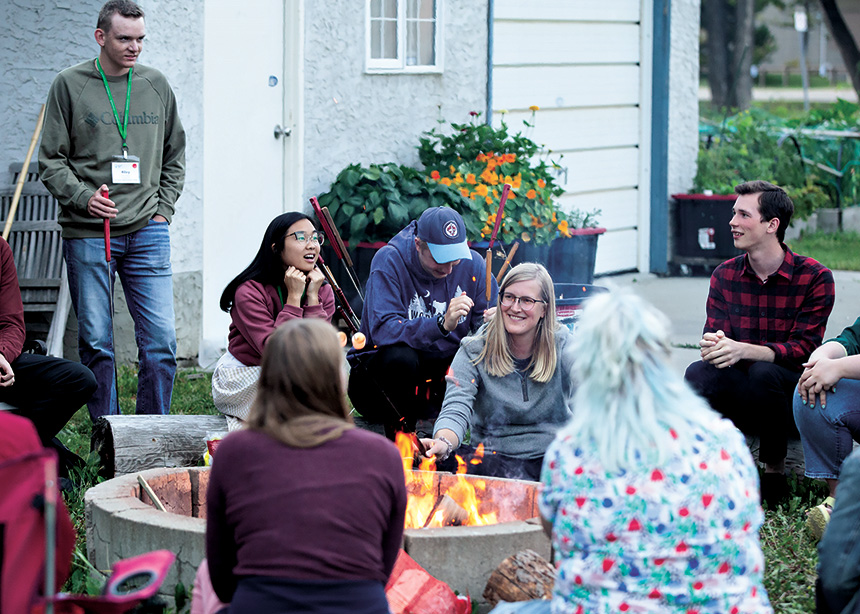
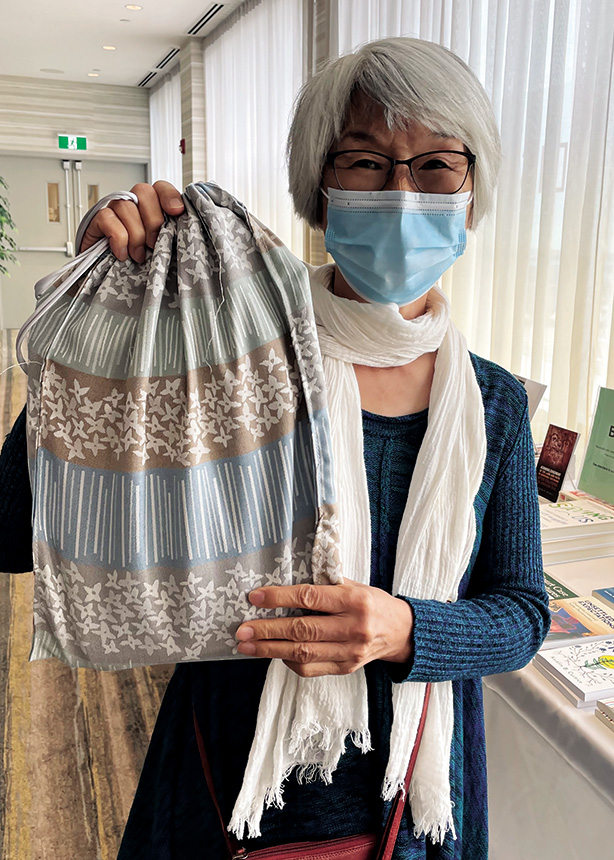
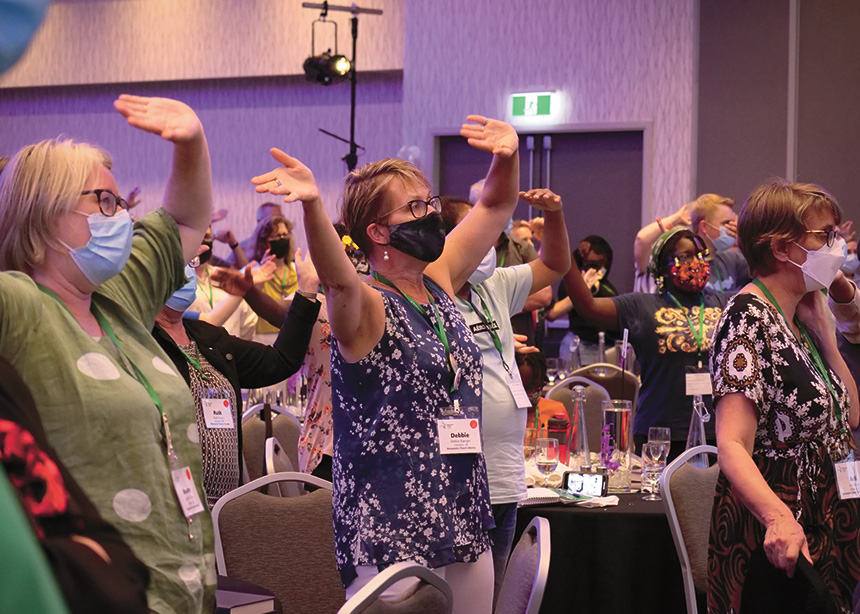




Leave a Reply
You must be logged in to post a comment.